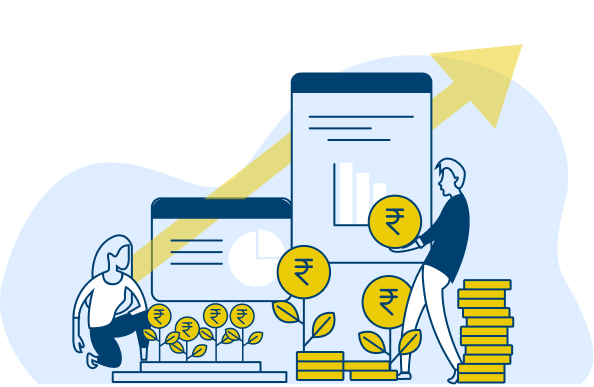SIP for Goal Based Investing
SIP can be your ideal partner in this journey of meeting financial goals as it is an adaptable investment facility. SIP ensures effective planning as you can invest an amount for each goal regularly from your savings. As SIPs can be separated for each goal, it ensures clarity of how much you have achieved so you do not need to sacrifice one goal for another.
Your investments should also be in line with your changing financial situation, so if your income/salary increases, so should your investments to keep up with the changing lifestyle costs. SIPs can be customized, increased, stopped in case of an emergency or started on any date you need. So, enhance the effectiveness of your financial planning with SIPs and plan right for your financial goals in life. Start SIP today.


Plan For Child’s Education
Do not let money come in between your child’s aspirations. Start regular savings or investments, if not early, along with your child’s pre-primary education. So, while your child gains knowledge, your investments are likely to turn into wealth with time and the same will take care of the higher costs for professional studies.


Plan For Child’s Wedding
Marriage expenses can be cumbersome given the changing trends in celebrations and cost inflation. Let not the inflation hole swallow the big wedding plans for your child. A nominal saving started at an early age specially for your child’s marriage can go a long way in meeting the future costs.

Frequently asked questions
1. Is SIP better or Lumpsum?
Choosing between SIP and Lumpsum depends on individual preferences, financial goals, and market conditions. SIPs offer the advantage of rupee cost averaging, where investors buy more units when prices are low and fewer units when prices are high, thus potentially reducing the impact of market volatility. On the other hand, Lumpsum investments can potentially offer higher returns if the market performs well, as the entire amount is invested upfront. However, lump sum investments are more exposed to market volatility. Therefore, the choice between SIP and Lumpsum depends on factors such as risk tolerance, investment horizon, and available funds.
2. How to start an SIP?
Step 1 - Define your investment goals and then based on risk appetite choose your investment mode
Step 2 - Make sure that you are KYC compliant
Step 3 - Choose the date and the duration of the SIP.
Step 4 - Choose the amount which you want to invest in the scheme on a regular basis (select the frequency based on your cashflows).
Step 5 - Start the SIP by submitting the form online or offline.
3. How are SIPs taxed?
The taxation of SIPs depends on the type of mutual fund you have invested in and the holding period. The tax applicability varies based on whether the fund is classified as equity or non-equity, and on the holding period, which determines whether the gains are treated as short-term capital gains or long-term capital gains.
4. When can I start investing in Mutual Funds?
You can start investing in mutual funds as soon as you're ready. There's no specific time restriction for investing in mutual funds. In fact, the sooner, the better. It is important to ensure you have a clear understanding of your investment goals, risk tolerance, and the types of mutual funds that align with your financial objectives before you start investing. Additionally, completing the necessary KYC process is essential before you can invest in mutual funds.
5. Is SIP available for all types of Mutual Funds?
No, SIP is not available for all types of mutual funds, but it's a common feature offered by many mutual fund schemes. It's essential to check the SID (Scheme Information Document) of the scheme to confirm whether SIP is available for the fund you're interested in investing in.
6. Can I switch my SIP investment from one fund to another?
Yes, you can switch your SIP investments from one fund to another within the same mutual fund house. However, it's essential to note that there might be certain conditions and charges associated with switching funds, such as exit load. It's advisable to consider consulting with a financial advisor to ensure that the switch aligns with your investment goals and overall financial plan.
7. How to calculate returns in SIP?
You can calculate your SIP returns using the below formula or using our SIP calculator.
FV = P [ (1+i)^n-1 ] * (1+i)/i Where FV = Future value or the amount you get at maturity, P = Amount you invest through SIP, i = Compounded rate of return, n = Investment duration in months.
SIP calculator is a simple tool that allows individuals to get an idea of the returns on their mutual fund investments made through SIP.

Loading...








